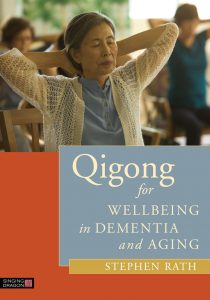a blog post by Stephen and Marcia Rath, authors of Qigong for Wellbeing in Dementia and Aging
Mindfulness meditation is the ability to develop one’s awareness of things in the present moment, internal and external, without attaching to the mind’s restless need to judge or think about the experience.
Any activity in a natural setting, such as walking or hiking, is an ideal way to cultivate present moment awareness because of the abundance of things in nature that you can see, hear, smell, and feel. This allows you to bathe in the experience while bringing your attention back to breathing and walking with deliberate steps when your mind begins to fill with unnecessary chatter. The Chinese call this chatter “monkey brain” because the mind can wander and jump around like a chattering monkey; and it is the one thing that keeps you from truly experiencing the present moment. The harder you try to tame it, the more it wanders. Instead of trying to leash it, meditators in the mindfulness tradition train themselves to become aware of the chatter without commenting on it. Judging your mind-chatter is seen as just another form of the chatter.
When my monkey brain begins to grow too chatty, I say to myself, open, as in, open to the present moment. Marcia says, breathe. This return to the present moment instantly allows your visual and auditory senses to become more panoramic and for you to develop a tactile awareness of the sensations beneath your feet and on your skin. You are once again cognizant of your surroundings. Here’s a sample from a walking meditation that Marcia and I enjoyed on the woody trails at the Lloyd Center for the Environment in South Dartmouth, MA:
The earthen path on the Osprey Outlook Trail is soft beneath my feet. Marcia walks on ahead, looking left and right as she takes in energy from the dappled light coming through the trees and the chirping of birds, which she scoops, one hand after the other, into her lower dan tian. A startled deer suddenly crashes through the underbrush to our left. Wow, it looked like a young doe to me. Has a fluffy white tail. We break out of the woods and begin to walk along a shrubbery peninsula that stretches into the Slocum River. It is low tide, and the fecund smell of seaweed and salty air fills my nostrils. The air is warm and soft on my face.
A low, primordial squawk shatters the air. My god, what was that? It sounded like some kind of raptor out of Jurassic Park! Memo to self, use that in an article. Was it a bullfrog, an Osprey—what was it? I’m thinking more than usual on this walk. Open… The path ends and we are now walking along the rocky shoreline. I struggle with my balance as the large river stones shift uncomfortably beneath my feet. We stop and take in the panorama, looking left, and then slowly turning our heads to the right, as Potomska, the mouth of the Slocum River, and the Demarest Lloyd State Park pass before our view. On the opposite shore, an Osprey is perched on a man-made wooden nest, beating its wings. Not hard to see why Ospreys are the symbol of the Lloyd Center.
Marcia and I stand still, taking in and releasing the sea air with slow, even breaths. We then turn and begin our trek back to the Lloyd Center. The earthen trail once again feels soft and comfortable beneath my feet. We pass by a large Holly tree. I brush against its thorny leaves. My breath quickens as we begin our climb…
As you can see from our walk in the woods, mind-chatter can separate you from the immediate experience of the environment. When you are in a state of mindfulness, you are not separate from the experience—you are in it. Research now confirms what individuals who are proficient in Qigong, Tai Chi, Yoga, and other traditions have observed empirically for thousands of years, namely, that meditation is good for your mental and physical health. Meditation activates the parasympathetic response and confers benefits that include: abatement in cortisol and the inflammatory response, as well as reductions in health concerns such as forgetfulness, elevated blood pressure, insomnia, anxiety, and depression, to name a few.
Enjoy activities in nature for a delightfully mindful experience!
 Qigong for Wellbeing in Dementia and Aging
Qigong for Wellbeing in Dementia and Aging
£15.99